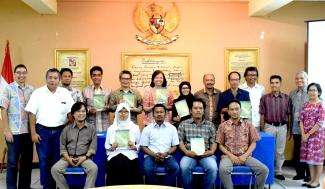A Policy Packet for community members was introduced in response to a disaster wherein state authority has brought little certainty or safety to the living arena of citizens, since predicaments arising from water-food-energy and identity crises followed a series of extraordinary disasters that hit Sumatra. This Policy Packet (is designed) to help balance the recently launched Economic Policies of the Jokowi Government (Paket I-IX).
Published in a book titled: Towards Alternative Solutions for Jokowi: Demand Grows to Recover Living Spaces, a book written and produced by NGO Network Node (Simpul Jaringan) in Sumatra, and published by Samdhana.
“The process took one year after the book The Collapse of Our Sumatra was released that subsequently offered a solution for the condition that had developed. We tried to write it from the point of view of employees, members of the local community, to reflect upon what we should ask from our government at this moment, so that it could be assimilated into policies,†said Nora Hidayati, one of the writers of the book.
The Policy Packet launched encompassed “Prompt Action by Government†to overcome crises of ecology, food-energy-water and social culture and outlined Three Strategic Steps:
(1) Stopping all kinds of eviction and criminalisation through recognition and protection of community management rights to their living spaces through beaurocracy, transparence of information in managing natural resources, certainty of law and equitable legal protection. (2) Improving revitalization of community living spaces through deregulation schemes for management of forest and land, tax incentives and finance for socially friendly and ecologically sound investments, budgetary support, improvements in the quality of development planning, the business climate and commerce within local communities. (3) Ensuring the availability of a healthy enviroment for all residents by putting an end to pollution caused by burning forests, nurturing the carrying capacity and potential support available within the environment, and developing disaster preparedness.
In detailing these Three Strategic Steps, a “Problems and Response Policy†was also outlined, covering the environment, forested and coastal areas, traditional communities and smoke pollution.
A response in writing by Sarwono Kusumaatmadja, the Chairman of the Climate Steering Committee was delivered by Agus Justianto. According to him all three guarantees to rescue the living spaces of communities are inaccordance with the basics provided within the Nationally Determined Contributions (NDC) that layed down a concept for climate resilience that will guarantee the safety of food, water and energy through adaptation, as well as mitigation of climate change.
“The National Policy and program that is already prepared supports the NDC document so we hope this will be able to be cross-checked within further meetings as outlined in Towards Alternative Solutions for Jokowi Government,†explained Agus, who is also a staff expert for the Natural Resource Economics department of the Ministry of Environment and Forestry.




